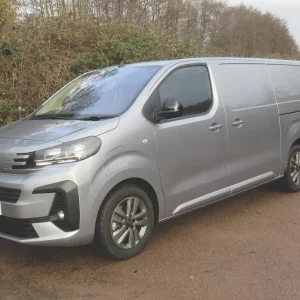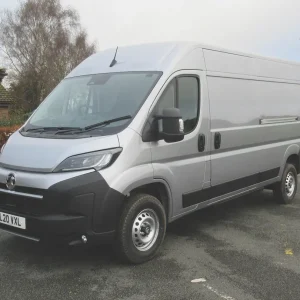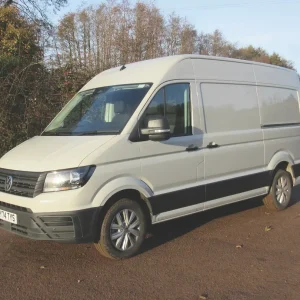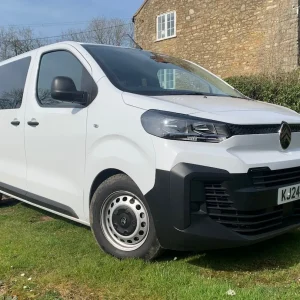Motor Start Stop
 On the Atego 7.5-tonner it’s known as MSS — Motor Start Stop — and is said to reduce diesel consumption by up to five per cent or more. So confident is Mercedes of its virtues that it is fitting it as standard to Atego from January 2009 onwards. MSS has been up for grabs as an option for the past three years.
On the Atego 7.5-tonner it’s known as MSS — Motor Start Stop — and is said to reduce diesel consumption by up to five per cent or more. So confident is Mercedes of its virtues that it is fitting it as standard to Atego from January 2009 onwards. MSS has been up for grabs as an option for the past three years.
After just three seconds it stops the engine if the vehicle is at a complete standstill and the gearlever is in neutral; it will not work if Atego is rolling backwards slightly, or rolling forwards. The engine will kick into life again if the clutch pedal is depressed, remember to push it down completely, or the truck starts to freewheel.
The headlights remain working while the engine is off and the battery is constantly monitored. If there is insufficient power to re-start the vehicle next time around, then MSS won’t go into action and the engine will keep running. Nor will it function if the outside temperature is below 0°C.
We sampled MSS in an Atego 816 on a test track at Mercedes-Benz World, the Three Pointed Star’s open-to-the-public — it incorporates a museum, a restaurant and a shop and is well worth visiting — complex at Brooklands in Surrey. Initially MSS is disconcerting, but after a few minutes you get used to it and appreciate its virtues; and they include a cut in noise pollution. If you are stationary and using a power take-off, then MSS can be switched off.
ECO-Start
 A similar and equally effective package is fitted to Sprinters with four-cylinder diesel engines and manual transmission under the ECO-Start banner and is said to cut diesel consumption by from five to eight per cent. However some drivers have been able to achieve savings of as much as 20 per cent, says the manufacturer.
A similar and equally effective package is fitted to Sprinters with four-cylinder diesel engines and manual transmission under the ECO-Start banner and is said to cut diesel consumption by from five to eight per cent. However some drivers have been able to achieve savings of as much as 20 per cent, says the manufacturer.
Pasty maker Ginsters has even been able to rack up a reduction of as much as 23 per cent when using a 313CDI Sprinter with ECO-Start in central London. As a consequence it’s considering running similar vehicles in other big cities including Birmingham, Manchester and Liverpool. Mercedes is making 50 ECO-Start demonstrators available at dealerships nationwide.
ECO-Start adds £545 to the cost of a standard specification Sprinter. In our opinion it is money well spent. In a bid to underline that view, Mercedes calculates that a van clocking up 25,000 miles annually at an average 25mpg will potentially pay back the option cost in terms of fuel savings in less than two years. That’s based on a diesel cost of £1.09 a litre and a six per cent fall in fuel use as a result of ECO-Start.
Sprinter NGT
 Continuing with the environmental theme we took to the highways of Surrey in a Mercedes-Benz Sprinter NGT — Natural Gas Technology — propelled by, as its name suggests, compressed natural gas (cng). It will also run on petrol if the gas runs out and the driver can switch between the two power sources.
Continuing with the environmental theme we took to the highways of Surrey in a Mercedes-Benz Sprinter NGT — Natural Gas Technology — propelled by, as its name suggests, compressed natural gas (cng). It will also run on petrol if the gas runs out and the driver can switch between the two power sources.
When run solely on cng it has a range of 280 miles; the gas tanks are mounted beneath the load floor, so they don’t steal cargo space, and are protected by a cover. The tanks and associated equipment add anywhere from 170kg to 300kg to the vehicle’s weight depending on the model.
Sprinter NGT is quiet, offers drastic reductions in harmful exhaust emissions, including a 25 per cent cut in CO2, and with a 156hp 1.8-litre engine married to a six-speed gearbox doesn’t lack performance. No matter whether you run it on gas or on unleaded, there is little discernible difference in the way it performs.
Cng is relatively inexpensive, which contributes to a claimed reduction in operating costs of up to 30 per cent when compared with a more conventionally-powered van. Remember though that cng has a lower calorific value then ordinary fuels, which means you’ll burn more to go a given distance.
While Sprinter NGT will also run on biogas generated from landfill sites, the big problem the vehicle faces is cng’s availability. While there are 2,500 filling stations in Europe that allow you to fill up with it, only five of them are in the UK. OK, some fleet operators have their own cng pumps, making the fuel a viable option if the van always returns to a depot that has one. What’s more, small businesses and the self-employed who are really keen on cng can always invest in a home unit that compresses and dispenses natural gas sourced from the domestic supply.
Verdict
We suspect that the appeal of cng will remain limited in Britain until forecourts with BP, Shell, Esso and Total signs above them set up cng pumps, and until the supermarket-based fuel outlets start taking an interest. Until then — unlike MSS and ECO-Start — it’s going to be a niche market.
Mitsubishi Fuso Canter Eco-Hybrid
While out on the test track we were also able to get to grips with Mitsubishi Fuso’s Canter Eco-Hybrid 7.5-tonner, fitted with both a diesel engine and an electric motor. A total of ten examples are on a three-year trial in London with prominent fleet operators including DHL, Tesco and TNT. Canter is distributed through Mercedes-Benz dealerships.
 Eco-Hybrid offers a fuel usage cut of up to 15 per cent plus lower CO2 emissions as a consequence. When you move away from rest only the electric motor is in operation. The 3.0-litre diesel — smaller than the ones usually found in a 7.5-tonner — kicks in rapidly, however, if you accelerate hard or the truck is heavily laden. Thereafter the motor and the engine work in harmony until the driver reaches cruising speed, when it’s diesel power only. Slow down and the motor helps to brake the vehicle.
Eco-Hybrid offers a fuel usage cut of up to 15 per cent plus lower CO2 emissions as a consequence. When you move away from rest only the electric motor is in operation. The 3.0-litre diesel — smaller than the ones usually found in a 7.5-tonner — kicks in rapidly, however, if you accelerate hard or the truck is heavily laden. Thereafter the motor and the engine work in harmony until the driver reaches cruising speed, when it’s diesel power only. Slow down and the motor helps to brake the vehicle.
What’s more, the motor/generator captures some of the braking energy and turns it into electricity which is stored in the lithium-ion battery pack, which has a projected life-span of nine years. The lightness of Canter’s chassis means that a more-than-respectable payload capacity remains available; the weight penalty imposed by all this technology is a modest 200kg.
Fitted with a semi-automatic gearbox, Eco-Hybrid proved to be a remarkably easy vehicle to drive, with a light touch on the accelerator pedal necessary if you are to realise its environmental benefits to the full. However, it has one big drawback; a likely price premium of 30 to 40 per cent over the standard model if it is made available commercially. Mitsubishi Fuso nonetheless reckons that it could sell perhaps 200 Eco-Hybrids annually in Britain.





